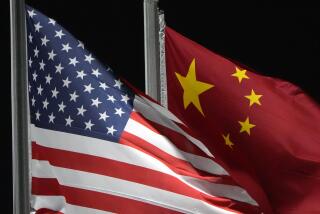Aerospace Firm Indicted Over Exports to China
- Share via
WASHINGTON — A federal grand jury Tuesday indicted aerospace firm McDonnell Douglas Corp., now owned by Boeing Co., and a Chinese airline partner on charges that the companies conspired to illegally divert sophisticated manufacturing tools to the Chinese military in violation of U.S. export laws.
At a time of heightened concerns over allegations that China has successfully pilfered U.S. military secrets, federal authorities charged that the scheme allowed $1.7 million in McDonnell manufacturing tools to wind up at a military plant in Nanchang, China, in 1994.
McDonnell Douglas executives knew that the material was destined for the Chinese military plant but, acting with “willful blindness,” lied to U.S. export officials by claiming that the tools would be used solely to make civilian airplanes in Beijing, according to an indictment returned Tuesday by a federal grand jury in Washington.
Boeing, the aerospace giant that bought McDonnell Douglas in 1997, was not named in the indictment, but it pledged to vigorously defend its Southern California subsidiary against all charges. Since the merger, Boeing has largely integrated McDonnell’s operations into its own.
“We do not believe that anybody at McDonnell Douglas committed any criminal violations,” said company spokesman Larry McCracken in Seattle.
It was McDonnell Douglas that notified U.S. authorities as soon as it realized some of its manufacturing tools were not in their “proper location,” and there is no evidence that any of the equipment was ever used for military purposes, McCracken said. He upbraided federal prosecutors for “not taking the time to learn the facts about a very complicated matter.”
But federal officials cast the indictment as a matter of critical national security, designed to ensure that foreign governments do not misuse U.S. technology. That issue has become particularly sensitive in recent months with regard to China, as leading lawmakers in Congress have pursued allegations that Beijing officials have aggressively sought to infiltrate U.S. nuclear and military intelligence bases in the public and private sectors.
The charges against McDonnell Douglas “send a message that no company is too big or too important to be indicted,” said F. Amanda Debusk, assistant secretary of the Commerce Department.
In addition to defendant McDonnell Douglas, the 16-count indictment also charges company executive Robert Hitt, who oversaw the company’s Chinese airline program and remains employed at Boeing; China National Aero Technology Import and Export Corp., a state-run firm in Beijing known as CATIC; two El Monte subsidiaries of CATIC; and two Chinese nationals employed by the Chinese firm.
If convicted on charges of making false and misleading statements to gain U.S. export approval, the corporate defendants face a total of $10 million in fines, while the individuals each face a maximum of five years in prison and $250,000 in fines. Hitt could not be reached for comment, and officials at the Chinese Embassy in Washington did not return calls.
Barbara Van Gelder, a Washington attorney representing CATIC, said it was “absurd” for federal prosecutors to suggest that the firm’s dealings with McDonnell Douglas had anything to do with national security. “This was a commercial transaction involving the sale of used machinery,” she said.
The episode began, according to the federal indictment, when McDonnell Douglas decided in the early 1990s to close down a production plant in Columbus, Ohio, and sell off equipment and assets, including large, sophisticated machining tools used in the production of aircraft parts.
CATIC was interested in buying some of the equipment and sent a delegation to the Ohio plant in 1993. Negotiations began, with McDonnell Douglas initially demanding more than $15 million. But the Chinese contacts balked at the price, and the sale also faced obstacles under U.S. export law restricting the transfer of military-related products to China, according to a narrative in the indictment.
But the indictment alleges that McDonnell Douglas was eager to finalize the sale--in part because it wanted to foster good relations with the Chinese in order to move ahead with a separate airliner contract worth as much as $1 billion. So the firm agreed to a much lower sale price of $5.4 million for the tools and other Ohio equipment, the indictment alleges, then falsified its export applications to gain approval for the sale “by presenting seemingly credible and noncontroversial justification” on how the equipment would be used.
Although McDonnell Douglas maintained that the tools would be used to produce Douglas jetliners under a license agreement, the real aim was “for unrestricted use at undisclosed facilities within the PRC [People’s Republic of China], including Nanchang, a factory known for its military production,” according to the indictment.
Debusk at the Commerce Department said that the actual use of the equipment in Nanchang--and whether it was ever put to work on military projects--”is one of the things that will have to be looked at in the sentencing phase of this case.”
More to Read
Inside the business of entertainment
The Wide Shot brings you news, analysis and insights on everything from streaming wars to production — and what it all means for the future.
You may occasionally receive promotional content from the Los Angeles Times.









